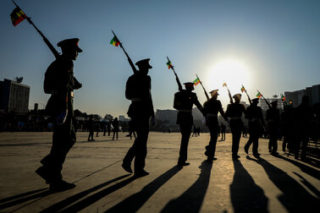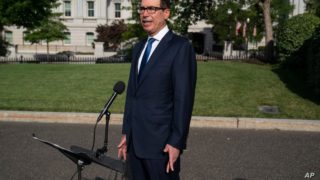The Ethiopian authorities have detained 16 United Nations staff members and dozens of drivers who were supposed to ferry food aid into the rebel-held Tigray region, the U.N. said, injecting new tension into the organization’s troubled relations with a government embroiled in civil war and facing a growing threat of famine.
The 16 U.N. staff members were seized in recent days in the capital, Addis Ababa, the chief U.N. spokesman, Stéphane Dujarric, said on Tuesday. An unspecified number of dependents of U.N. staff in the country were also detained, Mr. Dujarric added, saying that no explanation was given as to why they were being held. The United Nations was seeking their immediate release.
In addition, the U.N. in Ethiopia said on Wednesday that the authorities had detained about 70 drivers who had been hired to transport relief aid into the Tigray region. The drivers, who had been hired by U.N. agencies and the aid group Catholic Relief Services, have been held since Nov. 3 in Semera, the capital of the Afar region, which borders Tigray. Some of them are Tigrayan, a U.N. spokeswoman said.
The U.N. is “following up continuously” with Ethiopian federal and regional authorities for their immediate release, she said.
The civil war, centered in the restive northern Tigray region but spreading elsewhere in Ethiopia, has created an enormous humanitarian emergency affecting seven million people, most of them in Tigray, and plunging tens of thousands into faminelike conditions.
In an effort to meet those needs, the U.N. and aid agencies have amassed large stocks of food and medicine at warehouses in Semera in recent months. But they say they have been prevented from delivering the aid because of what they call a de facto Ethiopian government blockade of Tigray.
Catholic Relief Services is the main partner for distribution of American government food aid in northern Ethiopia.
In New York, Mr. Dujarric said all of the detained staff members were of Ethiopian nationality, but he could not specify their ethnicity. News reports from Ethiopia have said many Ethiopians of Tigrayan ethnic descent have been seized in Addis Ababa since the central government declared a state of emergency last week, as Tigrayan rebels threatened to march south toward the capital.
Efforts by U.N. relief agencies to aid civilians imperiled by the conflict have been curtailed by the spreading war and bureaucratic impediments erected by the government, despite repeated pleas by the U.N. secretary general, António Guterres, to allow unimpeded access.
The United States and other Western countries have repeatedly called on the Tigrayans to halt their march on Addis Ababa and enter peace talks. The United States’ special envoy to the Horn of Africa, Jeffrey Feltman, shuttled between Ethiopia and Kenya over the weekend in an effort to find a diplomatic solution.
But there is little sign that either side is ready to negotiate, and the Tigrayans say they need to keep fighting to break the government-imposed siege of their region, open up aid supply routes and save vulnerable people from starvation.
In a report released on Wednesday, Human Rights Watch said the Ethiopian blockade was denying critical medical support to sexual assault victims in Tigray.
Tigrayans have also been accused of sexual violence as the war has spread to other parts of Ethiopia. Amnesty International said Wednesday that 16 women had been raped in a village in the Amhara region in mid-August by Tigrayan fighters who looted and destroyed medical facilities.
The Ethiopian government has regularly accused the United Nations, Western media and some outside humanitarian groups of sympathizing with the Tigrayan rebels. Mr. Guterres has strongly denied that the United Nations has shown any bias in the conflict.
Tensions between Mr. Guterres and Prime Minister Abiy Ahmed of Ethiopia, the 2019 Nobel Peace Prize laureate whose legacy and political future are now at risk from the strife, have grown in recent months. They took a sharply negative turn after Mr. Abiy’s government ordered the expulsions of seven top U.N. relief officials on Sept. 30 on accusations that they were interfering in his country’s affairs.
Asked if Mr. Guterres was further frustrated by news of the detentions, Mr. Dujarric said: “The secretary general is frustrated by the lack of ability to help people in need.”

Ethiopian officials had no immediate comment on the detentions. A message left for Ethiopia’s United Nations ambassador, Taye Atske Selassie Amde, was not returned.
Rebels turned the tide. Despite Mr. Abiy’s promise of a swift campaign, the Ethiopian military suffered a major defeat in June when it was forced to withdraw from Tigray. Now the fighting is rapidly moving south.
Tigrayan forces close in. In late October, Tigrayan rebels captured two towns near Addis Ababa, the nation’s capital. The government declared a state of emergency and called on citizens to arm themselves.
A mounting crisis. As the rebels drew closer, Mr. Abiy vowed to “bury this enemy” in an inflammatory speech. His comments came as a U.N. report offered evidence that all sides had committed atrocities.
No end in sight. President Biden has threatened to impose sanctions on the country to coax the sides to the negotiating table, but the war’s current trajectory could cause the collapse of Ethiopia.
Mr. Dujarric reported the detentions a day after the top U.N. humanitarian relief official, Martin Griffiths, completed a four-day visit to Ethiopia, including to the capital of the Tigray region, Mekelle.
In a statement issued at the conclusion of his trip, Mr. Griffiths said he had held “constructive discussions” with Mr. Abiy and his deputy prime minister and foreign minister, Demeke Mekonnen, on “the challenges aid organizations face in getting assistance to all Ethiopians in need.”
News of the detentions also came a day after the U.N. Security Council met to discuss the conflict, with all 15 members exhorting the antagonists to resolve their issues through political negotiations.
Diplomacy aimed at achieving that outcome has intensified in recent days. Mr. Feltman, and an African Union envoy, Olusegun Obasanjo, a former president of Nigeria, have been holding talks in Ethiopia.
Mr. Obasanjo told the Security Council on Monday that all sides in the conflict agreed “individually that the differences between them are political and require a political solution through dialogue.”
FEATURED IMAGE: No explanation was given as to why the workers had been detained. The United Nations was seeking their immediate release, according to a spokesman. Credit…Associated Press
By Rick Gladstone and Declan Walsh/The New York Times





